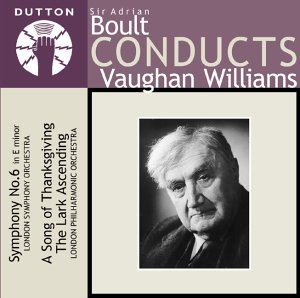This disc is one of Dutton's super-bargain "Conducts"
series and in this case the pairing is one which many people, myself
included, often think of as a quintessential combination - Boult and
Vaughan Williams. It couples two performances, all be it superlative
ones, of much recorded works with a relative rarity which, to these
ears at least, is actually a (minor?) masterpiece.
The Sixth Symphony is notable, apart from the quality
of the performance, in that it provides us with both the original and
revised versions of the third, scherzo movement. The Lark Ascending
is beautifully played by Jean Pougnet and this reading fully stands
comparison, in artistic terms at least, with the best we have had since
(e.g. Hugh Bean (also with Boult), Iona Brown (with Marriner and the
ASMF) and Tasmin Little (with Andrew Davis)). The real discovery and
worth the very modest price of the disc alone, even ignoring the excellent
couplings, is A Song of Thanksgiving, a choral, orchestral piece
which also features a narrative, mainly derived from the Old Testament
book of Isaiah.
The Symphony was recorded five years before the rightly
championed Decca (now Belart and Australian Eloquence) version with
which it has much in common in terms of its full-blooded delivery, with
some extra urgency added by generally faster tempi. In this recording,
the scherzo revision makes little difference to timing but, as Michael
Kennedy's excellent notes reveal, its main change was that it "inserted
a new theme for brass at five points". However, I found the mysterious
final movement the most memorable.
Michael Kennedy also describes The Lark Ascending
as "one of Vaughan Williams's most original and ultimately flawless
works" an indication, perhaps, of how familiarity might breed (has bred?),
if not contempt, then complacency about some of our greatest music.
Even without any personal input on their part, I would defy any violinist
to play it not in a lyrical way. However, as mentioned above,
no-one hearing this version could fail to grasp, at the very least,
its sheer beauty and rapt contemplation of the nature it celebrates.
A Song of Thanksgiving,
originally known as Thanksgiving for Victory,
was composed in 1944, in response to a 1943
BBC commission for "a work to be performed
when Hitler's Germany was defeated". It is
scored for soprano, choir and full orchestra
(plus organ and narrator) and ought, in a
fair world, to be an absolute must for Last
Night of the Proms (given the current hullabaloo
especially!). However, in a world dominated
by materialism and/or political correctness,
some magnificent music has, perhaps, contributed
to its own neglect by its very choice of texts.
Vaughan Williams sets some beautiful verses
from Chapters 60 and 61 of Isaiah, at once
both visionary and comforting, including "beauty
for ashes, the oil of joy for mourning", "And
they shall build the old wastes, they shall
raise up the former desolations, and they
shall repair the waste cities, the desolations
of many generations", and "Violence shall
no more be heard in thy land, wasting nor
destruction within thy borders; but they shalt
call thy walls Salvation, and thy gates Praise".
After declamation by the narrator, these verses
are reprised by the choir and accompanied
by music very much in keeping with and of
the same quality (i.e. very high) as that
of the Fifth Symphony and Pilgrim's Progress.
The final section sets Kipling in the Children's
Song from Puck of Pook's Hill,
quietly initiated by the girls' choir but
building to a great climax. In my mind, although
its context is entirely different, this does
not suffer by comparison with other great
Kipling settings by, for example, Grainger
and Koechlin. The words speak the language
of a benign, non-jingoistic patriotism and
I reprint the last two verses below as an
example:-
Teach us delight in simple things,
and mirth that has no bitter
springs,
forgiveness free of evil done,
and love to all men 'neath the sun.
Land of our birth, our faith,
our pride,
for whose dear sake our fathers died;
O Motherland, we pledge to thee
head, heart and hand through the years to
be.
Needless to say, this is turned into a hymn of praise
rather than anything resembling bombast. As evidenced by many of his
other pieces as well, The Lark Ascending included, Vaughan Williams
has few if any equals (Finzi?) in evoking what was and, I hope still
is, the real spirit of England - a spirit defined by modesty, tolerance
and vision. This disc reissues, at a very small price, some uniquely
valuable recordings. Particularly if you have never heard A Song
of Thanksgiving, it should be regarded as an essential purchase.
Neil Horner


